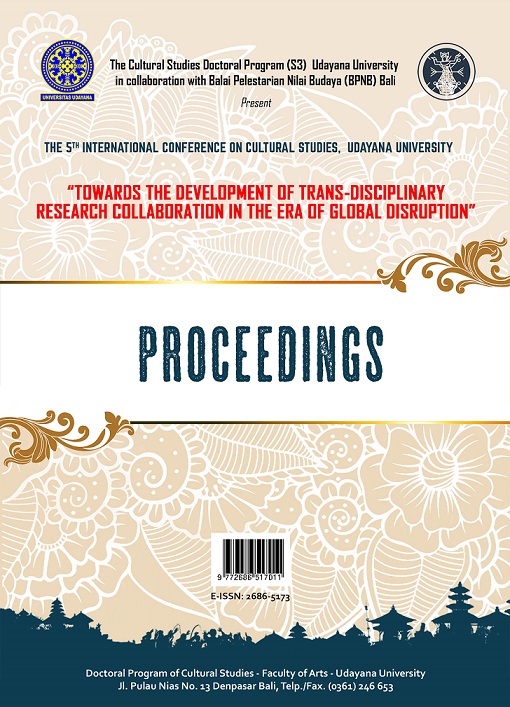LANGUAGE DIVERSITY IN TOURISM AREA AT UBUD VILLAGE
Abstract
Balinese people who live at Ubud Village in Gianyar Regency are bilingual because they have mastered more than one languages. In the environment of Balinese language, there also live other languages, e.g. the national language, i.e. Indonesian language, foreign languages such as English, Japanese, Mandarin, Korea, etc. Balinese people nowadays have difficulties in using Balinese language so they use mixed languages, namely Balinese language with Indonesian language, with English language, with Mandarin or Korean Language, etc. This phenomenon might indicate that Balinese language appears to be marginalized.
This paper aims at investigating what languages are used in Balinese language environment, since by tradition, ecological locality is very important to be explained because it has strong relation to the sustainability of the use of Balinese language, and natural environment with its diversity. Sociocultural approach, i.e. using the concept of language diversity related to the use of language is applied in this paper. In addition, qualitative method is applied by using observation technique and in-depth interview in collecting the data and information. Theories related to the use of language is used to analyze the data.
The result of the study shows that the marginalization of Balinese language appears to exist because there are various ethnic groups of immigrants who live in this village. The village of Ubud is already occupied by expatriates who deliberately come to Bali and settle at Ubud. The reasons why they choose Ubud Village, among others is business they own in tourism sector, the occurrence of intermarriages between Balinese people at Ubud and foreigners (such as Italian, Australian, French, Spaniard, etc), Balinese arts and cultures,etc. This condition affects the choice and use of languages.
Downloads
References
Aminuddin, 2002. "Pendekatan Linguistik Kritis : Roger Flower", dalam AnalisisWacana dari Linguistik Sampai Dekonstruksi (Kris Budiman,Penyunting). Yogyakarta : Penerbit kanal. Halaman 1-53.
Ardika, I Wayan. 2007. Pusaka Budaya & Pariwisata. Denpasar: PustakaLarasan.
Atmadja, Nengah Bawa. 2005. Bali pada Era Globalisasi: Pulau Seribu Pura Tidak Seindah Penampilannya. Singaraja (naskah tidak terbit).
Bogdan, Robert dan Steven J. Taylor. 1984. Introduction to Qualitative Research Methods The Search for Meaning. New York: John Wuley & Sons.
Fay, Brian. 2002. Filsafat Ilmu Sosial Kontemporer. Yogyakarta: Penerbit Jendela.
Fill, Alwindan Peter Muhlhausler (eds.). 2001. The ecolinguistics Reader. Language, Ecology, and Environment. London and New York: Continuun
Fishman, J. A. 1969. ‘The Sociology of Language’, dalamGiglioli, P. P. 1972:45—48. Language and Social Context. England: Penguin Books.
Jorgensen, M. W. dan Louise J. Philips. 2007. Analisis Wacana: Teori danMetode. Yogyakarta : Jalasutra.
Keriana, I K. 2004. Campuran Kode dalam Penggunaan Bahasa Balipada Rapat AdatDesa Pakraman Kedewatan, Ubud, Gianyar. Tesis Jurusan Bahasa,IKIP Negeri Singaraja.
Mulyana, Deddy. 2006. Metodologi Kualitatif: Paradigma baru Ilmu Komunikasidan Ilmu Sosial Lainnya. Bandung: PT Remaja Rosdakarya.
Romaine, S. 1995. Bilingualism. Cambridge: Blackwell.
Satori, Djaman dan Aan Komariah. 2009. Metodologi Artikel Kualitatif.Bandung: Alfabeta.
Steger, Manfred B. Globalisme Bangkitnya Ideologi Pasar. Yogyakarta: Lafadl.
Sutjiati Beratha, Ni Luh, I WayanSukarini, I Made Rajeg. 2015. ‘IdeologiPenggunaanBahasa Bali di KelurahanUbud’ dalamMudraJurnalSeniBudayaInstitutSeniInonesia, Volume 30, Nomor 1 Pebruari 2015.
______. 2017. ‘ Balinese Language Ecology - Study About Language Diversity in Tourism Area at Ubud Village’dalamJurnal Kajian Bali, Volume 07, Nomor 2 Oktober 2017.
Takwin, Bagus. 2003. Akar-Akar Ideologi. Yogyakarta: Jalasutra.
Thompson, John B. 2007. Analisis Ideologi, Kritik Wacana Ideologi-ideologi Dunia (Haqqul Yaqin, penerjemah). Yogyakarta: IRCiSoD.

This work is licensed under a Creative Commons Attribution-NonCommercial-ShareAlike 4.0 International License.





